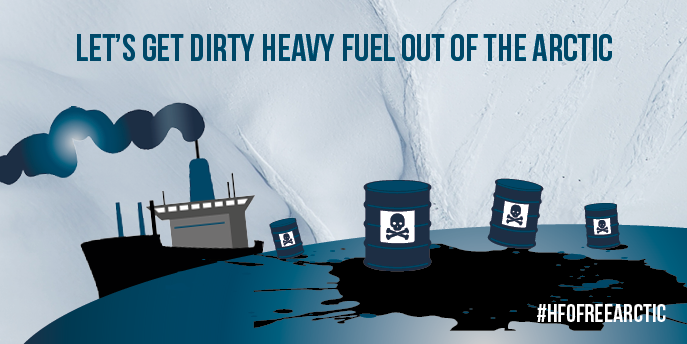Brussels, 31 January 2017:- Responding to the news that the European Parliament Resolution on the Arctic had been passed by its environment and foreign affairs committees, Dr Sian Prior, lead advisor to the Clean Arctic Alliance, said:
“The Clean Arctic Alliance welcomes the clear position by the European Parliament’s environment committee, in particular its call for an HFO free Arctic. Banning heavy fuel oil use by ships operating in the Arctic would reduce both the impact of oil spills and the levels of pollutants which drive the melting of snow and ice in the Arctic. This Resolution is a clear message to the International Maritime Organization that European citizens want a ban on the use of HFO in the Arctic adopted by 2020”.
Faig Abbasov, shipping policy officer at Transport & Environment, said: “We welcome MEPs taking the bold initiative to call for a ban on the use of the world’s dirtiest fuel in the Arctic. It’s unfortunate that the issue is not even on the IMO’s agenda as yet. EU member states should follow the political resolve shown by Europeans’ representatives and champion the protection of one of the most vulnerable ecosystems in the world at the IMO.”
Background:
The Arctic resolution represents the European Parliament’s position regarding the Joint Arctic communication published by by the EC and EEAS in April 2016. The resolution is a non-legislative document, which together with similar conclusions by the EU Council will guide future EU policy addressing environmental risks in the Arctic.
Despite its positive language towards environmental protection, the joint Communication by the EC/EEAS fell short of calling for a ban on HFO use by ships in the Arctic, prompting disappointment in April last year from the environmental organisations that would later form the Clean Arctic Alliance.
In contrast, the resolution adopted by the EP environment and foreign affairs committees, “calls on the Commission and the Member States to take all necessary measures to actively facilitate the ban on the use of heavy fuel oil (HFO) and carriage as ship fuel in vessels navigating the Arctic seas through the MARPOL Convention, and/or through port state control as regulated in the waters surrounding Antarctica; invites the Commission to include the environmental and climate risks of the use of HFO in its study on the risks that the increase in navigation of the Northern Sea Route would bring; calls on the Commission, in the absence of adequate international measures, to put forward proposals on rules for vessels calling at EU ports subsequent to, or prior to, journeys through Arctic waters, with a view to prohibiting the use and carriage of HFO”
About Heavy Fuel Oil
- Heavy fuel oil (HFO) is a viscous fossil fuel used to power ships and deliver goods all over the world. As the dirtiest and most polluting of fuels, HFO is a problem wherever it’s used, but if spilled in colder regions, such as Arctic waters, HFO breaks down even more slowly and can devastate livelihoods and ecosystems.
- HFO produces harmful and significantly higher emissions of air pollutants, including sulphur oxide, nitrogen oxide, particulate matter, and black carbon (BC). When emitted and deposited on Arctic snow or ice, the climate warming effect of black carbon is at least three times more than when emitted over open ocean.
- In December 2016, Canada and the US announced a joint “phase down” of HFO from their respective Arctic regions (see Clean Arctic Alliance response). In September 2016, both countries had formally notified the International Maritime Organization that a “heavy fuel oil spill in the Arctic could cause long-term damage to the environment”.
- During the IMO’s MEPC 70 meeting in October 2016, three papers addressing the HFO problem were presented, along with one on Arctic food security. In response, several Arctic countries, and in an unusual move, the IMO Secretary-General Kitack Lim, stated that they shared the concerns summarised by the papers and on the need for further consideration of the risks of HFO (see Clean Arctic Alliance response).
- The Clean Arctic Alliance believes that a ban on HFO in the Arctic can be achieved by 2020 if governments and business demand action by the International Maritime Organization to ban the use of HFO. The Alliance encourages the shipping industry switch to higher quality, alternative fuels, before such a ban is in place.
The Arctic Commitment:
On January 25th, expedition cruise ship operator Hurtigruten and the Clean Arctic Alliance signed the Arctic Commitment, which challenges businesses and organisations to step forward and call on the International Maritime Organization to implement a phase-out of polluting heavy fuel oil (HFO) from Arctic shipping by 2020.
A number of other organisations, including the Association of Arctic Expedition Cruise Operators, have also now signed the Arctic Commitment. The full text of the Arctic Commitment, and the list of signatories can be found here: http://www.hfofreearctic.org/en/the-arctic-commitment/
About the Clean Arctic Alliance
The following not-for-profit organisations form the Clean Arctic Alliance, which is committed to achieving the phase-out of HFO as marine fuel in the Arctic:
Alaska Wilderness League, Bellona, Clean Air Task Force, Danish Ecological Council, Environmental Investigation Agency, European Climate Foundation, Friends of the Earth US, Greenpeace, Icelandic Nature Conservation Association, Nature And Biodiversity Conservation Union, Ocean Conservancy, Pacific Environment, Seas At Risk, Transport & Environment and WWF.
For more information visit http://www.hfofreearctic.org/
Contacts
Dave Walsh, Communications Advisor, HFO-Free Arctic Campaign, [email protected], +34 692 826 764


